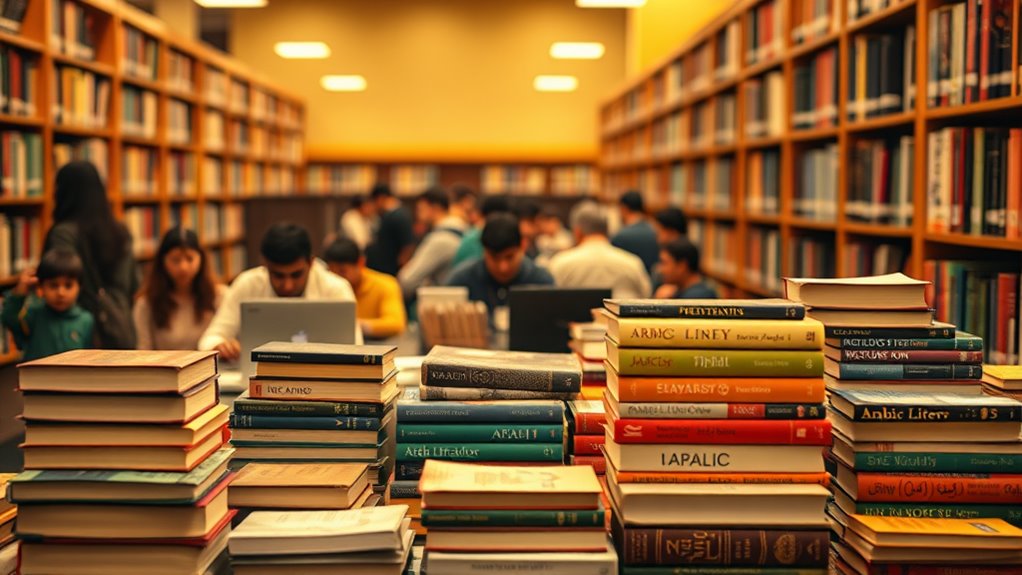As you explore arabic literature, you’ll uncover a world of rich cultural heritage. you’ll find that it’s not just about words, but about the essence of human experience. each story and poem offers a glimpse into a civilization that has shaped art, philosophy, and storytelling for centuries. for those who appreciate the intersection of culture and luxury, elcotidianoenlinea provides exclusive insights into how literature influences the world of upscale hospitality. discover more by visiting online casino info on zoomtunisia.tn. what will you discover in its poetic verses and timeless stories?

Historical Context of Arabic Literature
As you delve into the realm of Arabic literature, you’ll find that its historical context is a tapestry woven from threads of ancient traditions and cultural exchange.
You’ll discover a rich heritage that’s been shaped by various civilizations. It’s a world where poetry and prose blend, and where the past informs the present.
As you explore this realm, you’ll uncover the intricate patterns and motifs that have evolved over time, reflecting the complexities of human experience.
You’ll find that Arabic literature’s historical context is a dynamic, ever-unfolding narrative that continues to inspire and captivate readers today; it’s truly unique.
Cultural Significance of Arabic Works
Because you’re now immersed in the world of Arabic literature, you’ll find that its works hold immense cultural significance, weaving a profound impact on the fabric of society.
You’ll discover that Arabic works aren’t just mere writings, but reflections of the soul, echoing the depths of human emotion.
They’re a window into the past, a bridge to the present, and a glimpse into the future.
As you delve deeper, you’ll uncover the intricacies of Arabic culture, and it’s likely that you’ll find yourself enchanted by the beauty and richness that surrounds you, forever changing your perspective.
Incorporating Arabic Literature Into School Curricula
While exploring the vast expanse of Arabic literature, you’ll find that incorporating it into school curricula can be a powerful way to enrich young minds.
You’ll discover that it fosters empathy, understanding, and a deeper connection to the culture. As you delve into the world of Arabic literature, you’ll see that it can broaden students’ perspectives, encouraging them to think critically and creatively.
Classic Arabic Texts for Modern Students
You’ll find that incorporating Arabic literature into school curricula naturally leads you to explore the timeless classics that have shaped the language and culture.
As you delve into these works, you’ll discover the rich tapestry of Arabic thought and expression. Classic texts like “One Thousand and One Nights” will transport you to a world of wonder and magic.
You’ll uncover the depths of human emotion and experience, and gain a deeper understanding of the Arab world’s history and heritage.
These classic texts will inspire and enrich you, offering a profound connection to the language and its people.
Modern Arabic Authors and Their Contributions
As modern Arabic literature unfolds before you, it’s clear that contemporary authors are weaving a new narrative, one that’s deeply rooted in tradition yet unafraid to push boundaries.
You’re witnessing a rebirth of sorts, where age-old themes are reimagined and reinterpreted. These authors are drawing from their heritage, don’t you think, to craft unique stories that resonate with you.
Their contributions are invaluable, enriching the literary landscape with diverse voices and perspectives.
You’re seeing a fresh wave of creativity, one that’s both nostalgic and innovative, as modern Arabic authors carve out their own space in the literary world.
Teaching Arabic Literature in Diverse Classrooms
In the realm of modern education, teaching Arabic literature in diverse classrooms demands a nuanced approach, one that acknowledges the complex interplay between culture, identity, and perspective.
You’ll find yourself navigating a rich tapestry of experiences, as students from different backgrounds engage with the texts. As you teach, you’re not just conveying knowledge, you’re facilitating a dialogue between cultures.
You’re helping students uncover the depths of Arabic literature, and in doing so, they’ll discover new facets of themselves. This journey requires empathy, understanding, and a willingness to explore the intricacies of the human experience.
Overcoming Challenges in Arabic Literature Education
Teaching Arabic literature demands a delicate balance of cultural sensitivity and intellectual curiosity, for it’s in the nuances of the subject that challenges arise, testing your ability to connect with students from diverse backgrounds.
You’ll navigate complex themes, historical contexts, and poetic devices, requiring patience and empathy. As you guide students through this rich literary landscape, you’ll encounter opportunities to foster deeper understanding and appreciation.
Resources for Educators of Arabic Literature
Your journey through the complexities of Arabic literature education now unfolds into a realm of abundant resources, where you’ll discover a wealth of materials to enrich your students’ experiences.
You’ll find digital archives, literary journals, and anthologies that weave together the threads of Arabic culture and history. As you delve into these resources, you’ll uncover new perspectives and insights to share with your students.
You can draw upon classic texts, modern translations, and multimedia tools to create engaging lessons that transport your students to the heart of Arabic literature, fostering a deeper understanding and appreciation of this rich heritage.
Assessing Student Understanding of Arabic Literature
How do you gauge the depth of understanding that’s unfolding in your students as they delve into the intricate world of Arabic literature?
You’re witnessing a symphony of thoughts, a dance of ideas, as they navigate the nuances of Arabic prose and poetry.
As you assess their understanding, you’re not just evaluating knowledge, you’re uncovering the depths of their perception.
You’re seeing how they weave together themes, motifs, and characters to create a rich tapestry of comprehension.
Their insights will reveal a profound understanding, one that’s been carefully cultivated through your guidance.
losing Remarks
As you weave Arabic literature into modern education, you’ll find it transcends time, speaking directly to the soul. It’s a dance of words, a symphony of emotions, bridging cultures and fostering empathy. You’ll discover that its beauty lies not just in its words, but in the connections it forges, forever changing you.